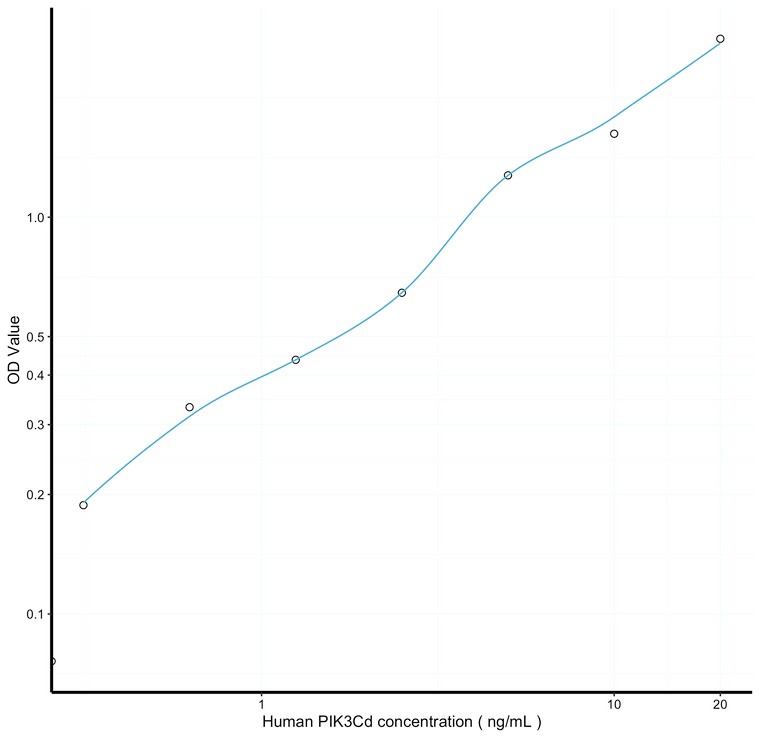| Applications: |
ELISA |
| Reactivity: |
Human |
| Note: |
STRICTLY FOR FURTHER SCIENTIFIC RESEARCH USE ONLY (RUO). MUST NOT TO BE USED IN DIAGNOSTIC OR THERAPEUTIC APPLICATIONS. |
| Sensitivity: |
0.086ng/mL |
| Detection Limit: |
0.312-20ng/mL |
| Short Description: |
This PIK3Cd Sandwich ELISA Kit is an in-vitro enzyme-linked immunosorbent assay for the measurement of samples in human tissue homogenates, cell lysates or other biological fluids.. |
| Storage Instruction: |
Store the unopened kit in the fridge at 2-8°C for up to 6 months. Once opened store individual kit contents according to components table provided with the kit. |
| Assay Time: |
4.5 hrs |
| Gene Symbol: |
PIK3CD |
| Gene ID: |
5293 |
| Uniprot ID: |
PK3CD_HUMAN |
| Sample Type: |
tissue homogenates, cell lysates or other biological fluids. |
| Tissue Specificity | In humans, the highest levels of expression are seen in peripheral blood mononuclear cells, spleen, and thymus, and low levels of expression in testes, uterus, colon, and small intestine but not in other tissues examined including prostate, heart, brain, and liver. Isoform 2 is expressed in normal thymus, lung and spleen tissues, and is detected at low levels in normal lysates from colon and ovarian biopsies, at elevated levels in lysates from colorectal tumors and is abundantly expressed in some ovarian tumors (at protein level). Both isoform 1 and isoform 2 are widely expressed. Isoform 1 is expressed predominantly in leukocytes. |
| Post Translational Modifications | Autophosphorylation on Ser-1039 results in the almost complete inactivation of the lipid kinase activity. |
| Function | Phosphoinositide-3-kinase (PI3K) phosphorylates phosphatidylinositol (PI) and its phosphorylated derivatives at position 3 of the inositol ring to produce 3-phosphoinositides. Uses ATP and PtdIns(4,5)P2 (phosphatidylinositol 4,5-bisphosphate) to generate phosphatidylinositol 3,4,5-trisphosphate (PIP3). PIP3 plays a key role by recruiting PH domain-containing proteins to the membrane, including AKT1 and PDPK1, activating signaling cascades involved in cell growth, survival, proliferation, motility and morphology. Mediates immune responses. Plays a role in B-cell development, proliferation, migration, and function. Required for B-cell receptor (BCR) signaling. Mediates B-cell proliferation response to anti-IgM, anti-CD40 and IL4 stimulation. Promotes cytokine production in response to TLR4 and TLR9. Required for antibody class switch mediated by TLR9. Involved in the antigen presentation function of B-cells. Involved in B-cell chemotaxis in response to CXCL13 and sphingosine 1-phosphate (S1P). Required for proliferation, signaling and cytokine production of naive, effector and memory T-cells. Required for T-cell receptor (TCR) signaling. Mediates TCR signaling events at the immune synapse. Activation by TCR leads to antigen-dependent memory T-cell migration and retention to antigenic tissues. Together with PIK3CG participates in T-cell development. Contributes to T-helper cell expansion and differentiation. Required for T-cell migration mediated by homing receptors SELL/CD62L, CCR7 and S1PR1 and antigen dependent recruitment of T-cells. Together with PIK3CG is involved in natural killer (NK) cell development and migration towards the sites of inflammation. Participates in NK cell receptor activation. Plays a role in NK cell maturation and cytokine production. Together with PIK3CG is involved in neutrophil chemotaxis and extravasation. Together with PIK3CG participates in neutrophil respiratory burst. Plays important roles in mast-cell development and mast cell mediated allergic response. Involved in stem cell factor (SCF)-mediated proliferation, adhesion and migration. Required for allergen-IgE-induced degranulation and cytokine release. The lipid kinase activity is required for its biological function. Isoform 2 may be involved in stabilizing total RAS levels, resulting in increased ERK phosphorylation and increased PI3K activity. |
| Protein Name | Phosphatidylinositol 4 -5-Bisphosphate 3-Kinase Catalytic Subunit Delta IsoformPi3-Kinase Subunit DeltaPi3k-DeltaPi3kdeltaPtdins-3-Kinase Subunit DeltaPhosphatidylinositol 4 -5-Bisphosphate 3-Kinase 110 Kda Catalytic Subunit DeltaPtdins-3-Kinase Subunit P110-DeltaP110delta |
| Database Links | Reactome: R-HSA-1257604Reactome: R-HSA-1660499Reactome: R-HSA-2219530Reactome: R-HSA-512988Reactome: R-HSA-6811558Reactome: R-HSA-8853659Reactome: R-HSA-9027276Reactome: R-HSA-912526Reactome: R-HSA-912631Reactome: R-HSA-9680350Reactome: R-HSA-983695 |
| Cellular Localisation | Cytoplasm |
| Alternative ELISA Names | Phosphatidylinositol 4 -5-Bisphosphate 3-Kinase Catalytic Subunit Delta Isoform ELISA kitPi3-Kinase Subunit Delta ELISA kitPi3k-Delta ELISA kitPi3kdelta ELISA kitPtdins-3-Kinase Subunit Delta ELISA kitPhosphatidylinositol 4 -5-Bisphosphate 3-Kinase 110 Kda Catalytic Subunit Delta ELISA kitPtdins-3-Kinase Subunit P110-Delta ELISA kitP110delta ELISA kitPIK3CD ELISA kit |
| output | |
Information sourced from Uniprot.org
12 months for antibodies. 6 months for ELISA Kits. Please see website T&Cs for further guidance







